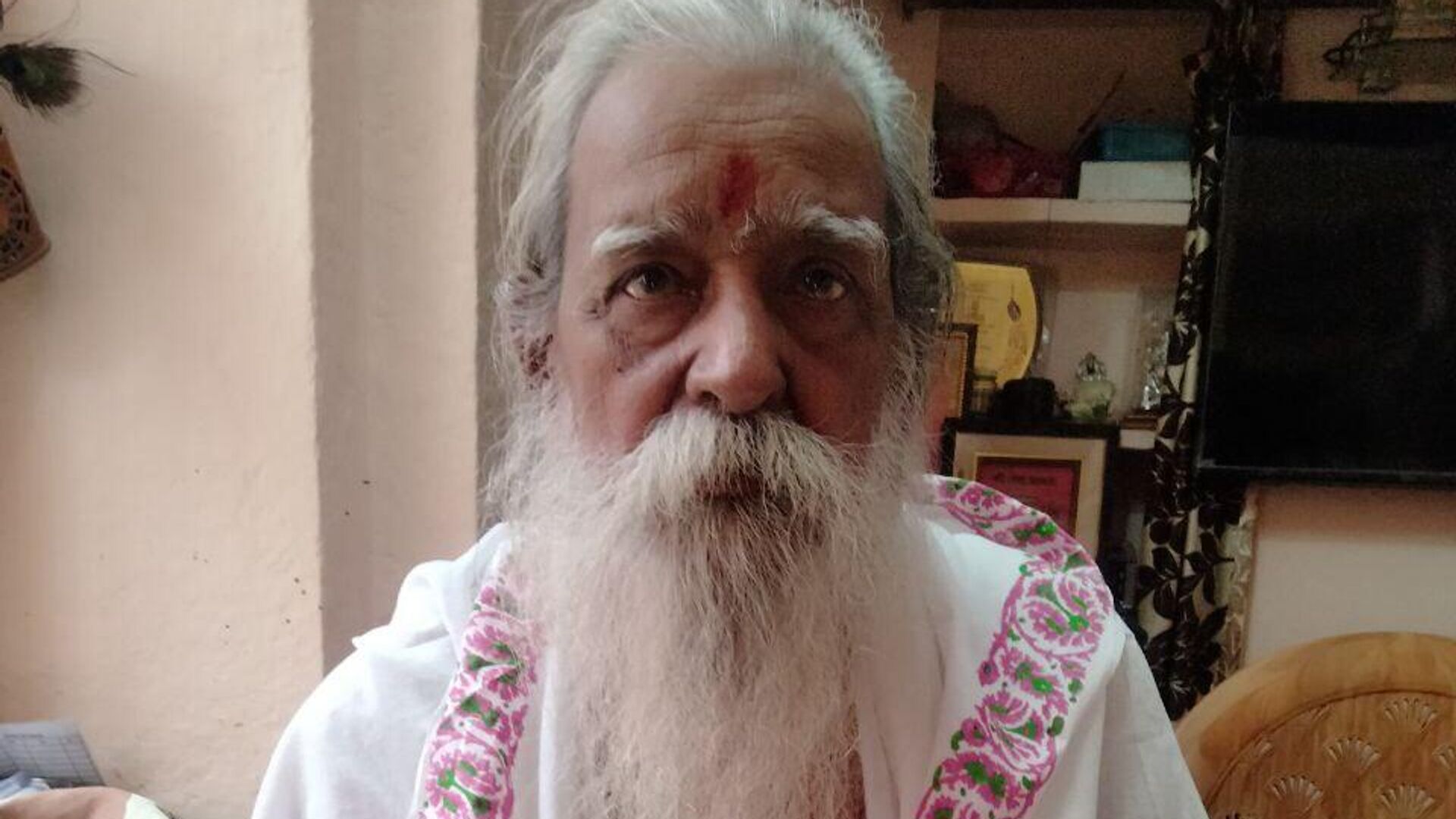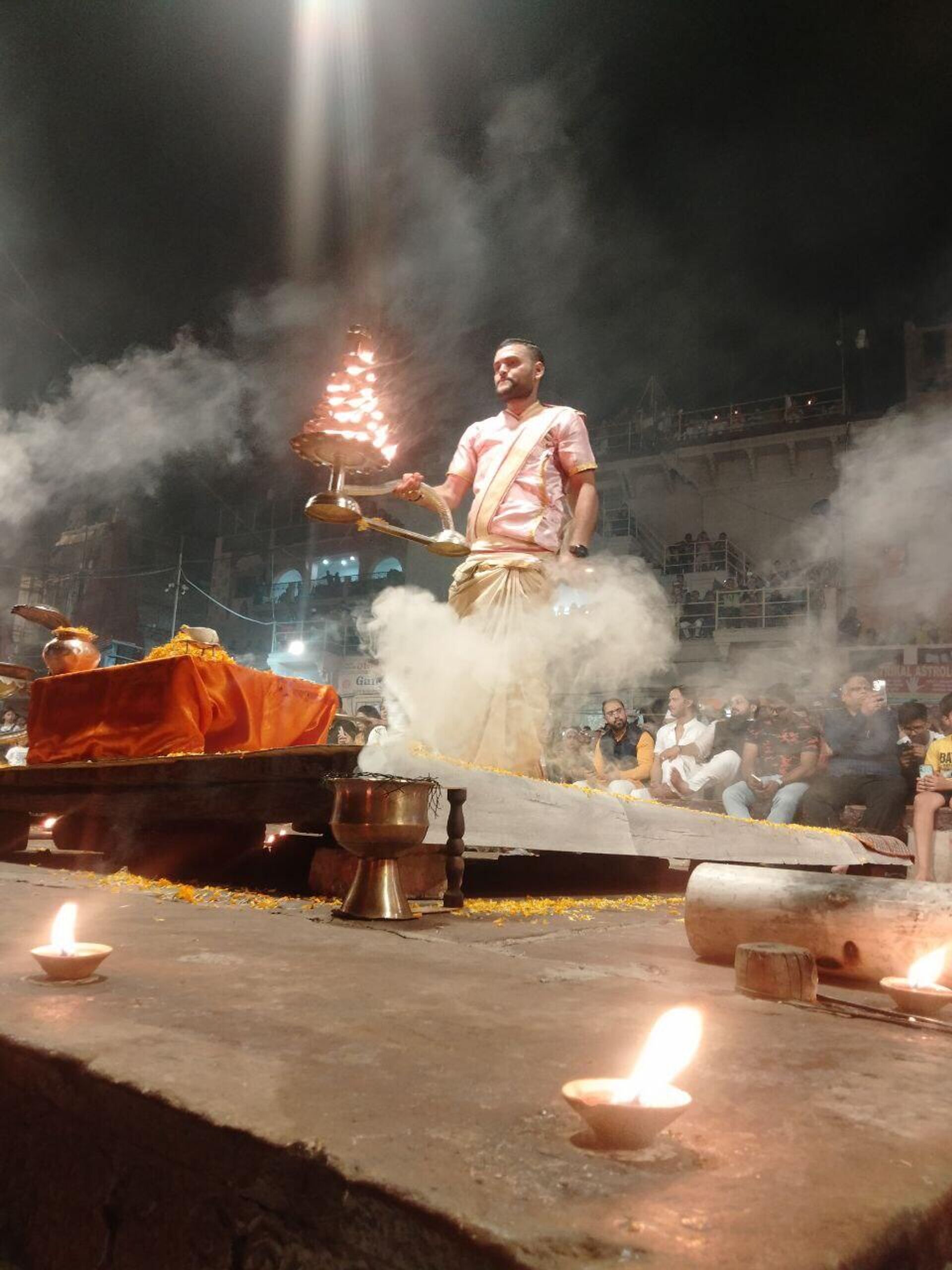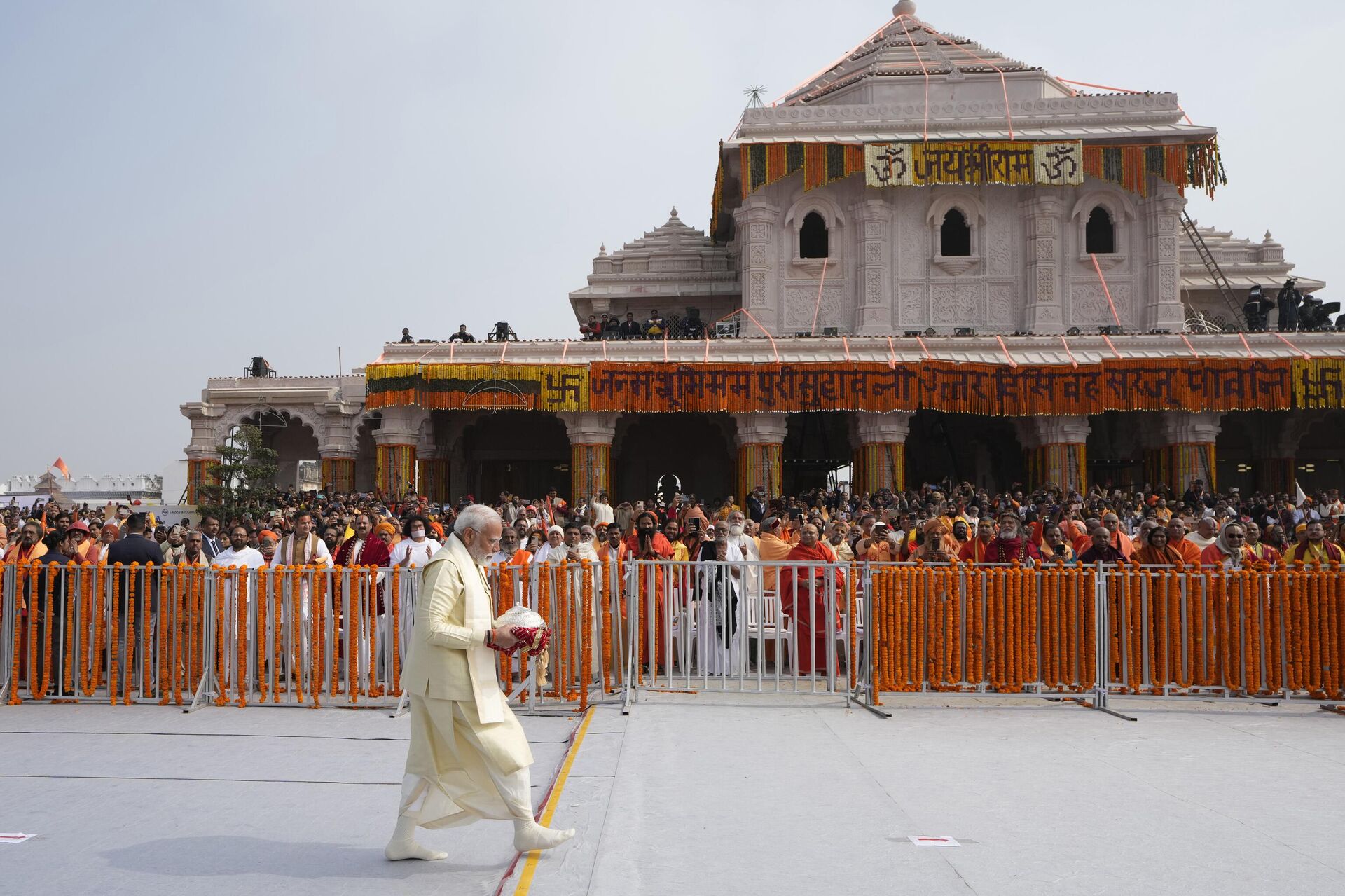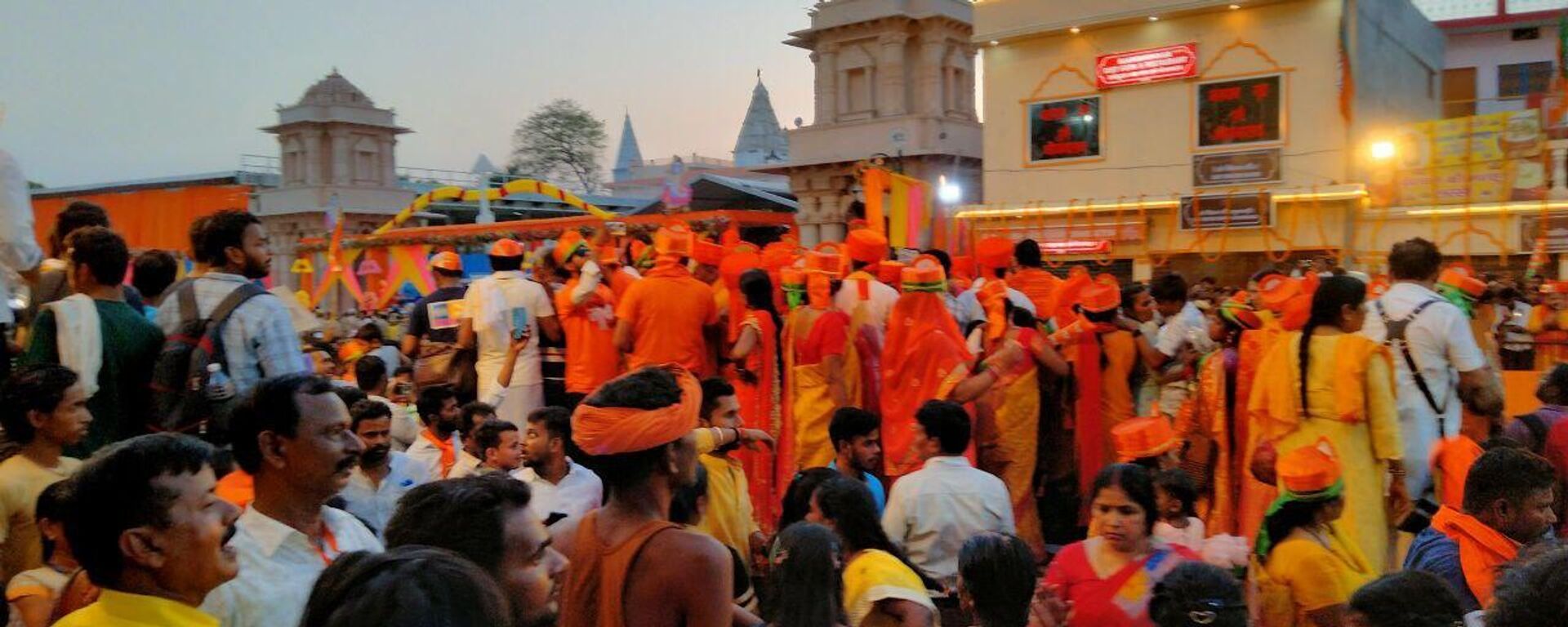https://sputniknews.in/20240510/indias-top-hindu-priest-slams-western-medias-mis-assessment-of-countrys-religious-politics-7324861.html
India's Top Hindu Priest Slams Western Media's Mis-assessment of Country's Religious Politics
India's Top Hindu Priest Slams Western Media's Mis-assessment of Country's Religious Politics
Sputnik India
PM Modi fulfilled the centuries-old wish of India's Hindus with the inauguration of the Ram Temple in the holy city of Ayodhya earlier this year and the man who supervised all the rituals associated with the consecration ceremony at the shrine was Acharya Laxmikant Mathuranath Dixit.
2024-05-10T08:25+0530
2024-05-10T08:25+0530
2024-05-10T08:25+0530
sputnik opinion
narendra modi
india
ram temple
ayodhya
bharatiya janata party (bjp)
rahul gandhi
indian national congress (inc)
lok sabha
lord rama
https://cdn1.img.sputniknews.in/img/07e8/05/08/7326014_0:77:960:617_1920x0_80_0_0_3a94ac5923fcdf5a4fb11c7ac8bb356c.jpg
Indian Prime Minister Narendra Modi fulfilled the centuries-old wish of India's Hindus with the inauguration of the Ram Temple in the holy city of Ayodhya earlier this year and the man who supervised all the rituals associated with the consecration ceremony at the shrine was Acharya Laxmikant Mathuranath Dixit.An 86-year-old Sanskrit scholar, Dixit's ancestry could be traced back to the 17th century when his forefathers were involved in the coronation of Chhatrapati Shivaji, the legendary King who waged a long battle against the Mughals before forming the Maratha empire in 1674.Interestingly, the politics over the Ram Temple seemed to have peaked in India when Lok Sabha polls in the South Asian sovereign state were on. A former Congress spokesperson recently dropped a bombshell by revealing that party scion Rahul Gandhi has plans to overturn the Supreme Court judgment that allowed the construction of the temple at the site where a disputed Islamic structure once stood.No Anger on Issue of Construction of Ram TempleAgainst this backdrop, the Varanasi-based Acharya Dixit underlined that other than the gross political statements made by politicians, especially members of India's opposition parties, calling Lord Ram a divisive figure, there's no anger on the issue of the construction of the Ram Temple at the erstwhile disputed site in Ayodhya.The followers of Islam only offered prayers there on Fridays after 1934.Since its inauguration, Muslims have expanded their businesses in Ayodhya - while some have become auto-rickshaw drivers who transport pilgrims to the temple complex, others are supplying milk which is used in making Prasad for the devotees, he disclosed.A portion of Muslims are even engaged in mass production of incense sticks, which are predominantly bought by their Hindu brethren visiting the Shri Ram Janmabhoomi Teerth Kshetra, Dixit continued.What's Behind Congress Party's Anti-Hindu ActionsIn the past, Congress termed Lord Ram imaginary and introduced draconian laws like the Places of Worship Act of 1991 and the Waqf Board Act of 1995. All these actions of the party have been deemed biased towards the majority of the nation.Explaining the grand old party's anti-Hindu mindset, Dixit noted that there is no rocket science in it to understand that the actions of the Congress have been against India's majority community.Hinduism's RenaissanceHe stressed that there's not an iota of doubt that under the leadership of PM Modi, Hinduism has found a second lease of life in India.Earlier, the chants of 'I am a Hindu and I am proud of it, were too few and infrequent. The present government has unified the Hindus in a manner that they are now thinking about their religion and the nation first. This is why, the dream of having a temple at the birthplace of Lord Ram could come to fruition after nearly 500 years, Dixit opined.Will BJP's Pro-Hindu Plank Help BJP in Lok Sabha Polls?With Hinduism finding its rightful place in India's polity under the current BJP government, there shouldn't be any kind of assumptions regarding the electoral benefits it would offer to the party in the 2024 Lok Sabha polls, Dixit stated.Particularly, in Uttar Pradesh, where the grand consecration ceremony of the Ram Temple took place in January, the BJP would do extremely well because the people in the state have realized that it was Modi who finally delivered on his promise of constructing the Mandir at the Lord's birthplace, Dixit expressed.Western Media's MiscalculationMeanwhile, Western media has been criticizing PM Modi for standing up for Hinduism, especially in the case of the inauguration of the Ram Temple.At the same time, in many Western countries, religious minorities are being oppressed by fellow citizens, while Europeans, for example, are becoming less and less religious.On the contrary, Muslims are prospering in India, and barring a few who are deeply rooted in the hardline form of Islam, admit, though in hushed tones that Islamic rulers before the country's independence committed mass crimes against Hindus and as a result, they feel that they are duty bound to forge closer ties with them, he highlighted.Moreover, there may be a backlash from organizations like the All India Muslim Personal Law Board (the administrative body that frames Muslim personal laws in India). But a majority of Muslims reckon that the community should hand back certain places of religious significance to the Hindus, which were plundered or captured by the Mughals or other Muslim rulers before 1947, Dixit maintained.
https://sputniknews.in/20240507/what-modis-policy-means-for-hindutva-heartland-7313250.html
india
ram temple
ayodhya
uttar pradesh
varanasi
Sputnik India
feedback.hindi@sputniknews.com
+74956456601
MIA „Rossiya Segodnya“
2024
Pawan Atri
https://cdn1.img.sputniknews.in/img/07e6/0c/13/139630_147:0:831:684_100x100_80_0_0_8fa2b25903e7787fe6a2698552c167df.png
Pawan Atri
https://cdn1.img.sputniknews.in/img/07e6/0c/13/139630_147:0:831:684_100x100_80_0_0_8fa2b25903e7787fe6a2698552c167df.png
News
en_IN
Sputnik India
feedback.hindi@sputniknews.com
+74956456601
MIA „Rossiya Segodnya“
Sputnik India
feedback.hindi@sputniknews.com
+74956456601
MIA „Rossiya Segodnya“
Pawan Atri
https://cdn1.img.sputniknews.in/img/07e6/0c/13/139630_147:0:831:684_100x100_80_0_0_8fa2b25903e7787fe6a2698552c167df.png
ram temple consecration ceremony, ram temple consecration ceremony priest, laxmikant mathuranath dixit, lok sabha polls, 2024 lok sabha polls, 2024 lok sabha elections, elections in ayodhya, lok sabha elections in ayodhya, elections in varanasi, lok sabha elections in varanasi, lok sabha polls in varanasi, lok sabha polls in ayodhya, 2024 elections, 2024 national elections in india, 2024 general polls in indian, indian national polls, indian general elections, india elections, 2024 india polls, 2024 india elections, narendra modi 2024 polls, modi 2024 polls, narendra modi 2024 elections, modi 2024 elections, bjp 2024 elections, bjp 2024 polls, why bjp will win 2024 polls, why bjp will win 2024 elections, modi news, bjp news, election news, 2024 election news, modi ayodhya, modi varanasi, bjp pro-hindu agenda,
ram temple consecration ceremony, ram temple consecration ceremony priest, laxmikant mathuranath dixit, lok sabha polls, 2024 lok sabha polls, 2024 lok sabha elections, elections in ayodhya, lok sabha elections in ayodhya, elections in varanasi, lok sabha elections in varanasi, lok sabha polls in varanasi, lok sabha polls in ayodhya, 2024 elections, 2024 national elections in india, 2024 general polls in indian, indian national polls, indian general elections, india elections, 2024 india polls, 2024 india elections, narendra modi 2024 polls, modi 2024 polls, narendra modi 2024 elections, modi 2024 elections, bjp 2024 elections, bjp 2024 polls, why bjp will win 2024 polls, why bjp will win 2024 elections, modi news, bjp news, election news, 2024 election news, modi ayodhya, modi varanasi, bjp pro-hindu agenda,
India's Top Hindu Priest Slams Western Media's Mis-assessment of Country's Religious Politics
Sputnik India spoke to one of the nation's top priests about the country's "politics of religion" amid election fever in the world's largest democratic state.
Indian Prime Minister Narendra Modi fulfilled the centuries-old wish of India's Hindus with the inauguration of the Ram Temple in the holy city of Ayodhya earlier this year and the man who supervised all the rituals associated with the consecration ceremony at the shrine was Acharya Laxmikant Mathuranath Dixit.
An 86-year-old Sanskrit scholar, Dixit's ancestry could be traced back to the 17th century when his forefathers were involved in the coronation of Chhatrapati Shivaji, the legendary King who waged a long battle against the Mughals before forming the Maratha empire in 1674.
Interestingly, the politics over the Ram Temple seemed to have peaked in India when Lok Sabha polls in the South Asian sovereign state were on. A former Congress spokesperson recently dropped a bombshell by
revealing that party scion Rahul Gandhi has plans to overturn the Supreme Court judgment that allowed the construction of the temple at the site where a disputed Islamic structure once stood.
"I have spent more than 32 years in the Congress and when the Ram Mandir decision came and construction started, Rahul Gandhi in a meeting with his close aides said that after the Congress government is formed, they will form a superpower commission and will overturn the Ram Mandir decision just like Rajiv Gandhi overturned the Shah Bano decision," Acharya Pramod Krishnam, who was expelled from the Congress in February told an Indian media outlet.
No Anger on Issue of Construction of Ram Temple
Against this backdrop, the Varanasi-based Acharya Dixit underlined that other than the gross political statements made by politicians, especially members of India's opposition parties, calling Lord Ram a divisive figure, there's no anger on the issue of the construction of the Ram Temple at the erstwhile disputed site in Ayodhya.
The followers of Islam only offered prayers there on Fridays after 1934.
"For instance, I have visited the Temple complex many a time - starting four months before the consecration ceremony in January 2024. But what gave me immense satisfaction and filled my heart with compassion, was the sight of thousands of Muslims being involved in various activities related to the Ram Temple's construction," Dixit told Sputnik India in an exclusive interview.
Since its inauguration, Muslims have expanded their businesses in Ayodhya - while some have become auto-rickshaw drivers who transport pilgrims to the temple complex, others are supplying milk which is used in making Prasad
for the devotees, he disclosed.
A portion of Muslims are even engaged in mass production of incense sticks, which are predominantly bought by their Hindu brethren visiting the Shri Ram Janmabhoomi Teerth Kshetra, Dixit continued.
"You would be astonished to know that Muslims, who have held close ties with Hindus in the city and have admired Lord Ram for his message of universal brotherhood, gave their services for free both inside and outside the temple," he added.
What's Behind Congress Party's Anti-Hindu Actions
In the past, Congress termed Lord Ram imaginary and introduced draconian laws like the Places of Worship Act of 1991 and the Waqf Board Act of 1995. All these actions of the party have been deemed biased towards the majority of the nation.
Explaining the grand old party's anti-Hindu mindset, Dixit noted that there is no rocket science in it to understand
that the actions of the Congress have been against India's majority community.
"Like everyone else in this nation, I assume that all this has been done because of vote bank politics. Still, I wouldn't blame Congress in its entirety. Had the Hindus been united, the Congress wouldn't have dared to play its minority appeasement card," he asserted.
He stressed that there's not an iota of doubt that under the leadership of PM Modi, Hinduism has found a second lease of life in India.
Earlier, the chants of 'I am a Hindu and I am proud of it, were too few and infrequent. The present government has unified the Hindus in a manner that
they are now thinking about their religion and the nation first. This is why, the dream of having a temple at the birthplace of Lord Ram could come to fruition after nearly 500 years, Dixit opined.
"Hence, I must admit that this awakening of the Hindus is definitely a kind of "renaissance" of Hinduism in India," the Acharya stressed.
Will BJP's Pro-Hindu Plank Help BJP in Lok Sabha Polls?
With Hinduism finding its rightful place in India's polity under the current BJP government, there shouldn't be any kind of assumptions regarding the electoral benefits it would offer to the party in the 2024 Lok Sabha polls, Dixit stated.
"The country is under the spell of Lord Ram at the moment, which would certainly translate into votes for the BJP in the ongoing elections," he emphasized.
Particularly, in Uttar Pradesh, where the grand consecration ceremony of the Ram Temple took place in January, the BJP would do extremely well because the people in the state have realized that it was Modi who finally delivered on his promise of constructing the Mandir at the Lord's birthplace, Dixit expressed.
"If someone (Modi) is taking the nation on the right path and in the right direction. If the country is developing, and if amity between communities is increasing, then what's wrong with electing a leader like Modi," he asked.
Western Media's Miscalculation
Meanwhile, Western media has been criticizing PM Modi for standing up for Hinduism, especially in
the case of the inauguration of the Ram Temple.
At the same time, in many Western countries, religious minorities are being oppressed by fellow citizens, while Europeans, for example, are becoming less and less religious.
"We often say that it is hard to take out politics from India's citizens and it is even harder to take out religion from its people. Therefore, the biggest mistake that the Western media is making about India's religious politics is their mis-assessment of the situation on the ground. For example, they often highlight the plight of minorities (read Muslims) in India," Dixit pointed out.
On the contrary, Muslims are prospering in India, and barring a few who are deeply rooted in the hardline form of Islam, admit, though in hushed tones that Islamic rulers before the country's independence committed mass crimes against Hindus and as a result, they feel that they are duty bound to forge closer ties with them, he highlighted.
Moreover, there may be a backlash from organizations like the All India Muslim Personal Law Board (the administrative body that frames Muslim personal laws in India). But a majority of Muslims reckon that the community should
hand back certain places of religious significance to the Hindus, which were plundered or captured by the Mughals or other Muslim rulers before 1947, Dixit maintained.
"According to me, this is where the Western media has failed to present the right picture of India's minorities because if they had genuinely tried to find out about their well-being in the country, they would have gotten the answer that India's Muslims enjoy far more freedom than their counterparts in the Middle East," he concluded.





